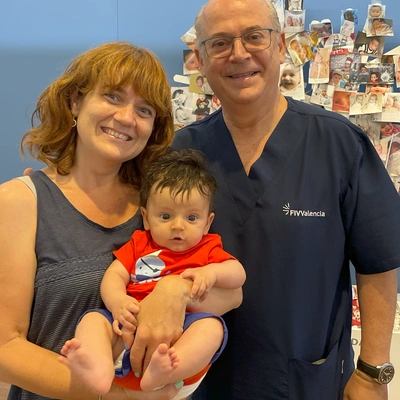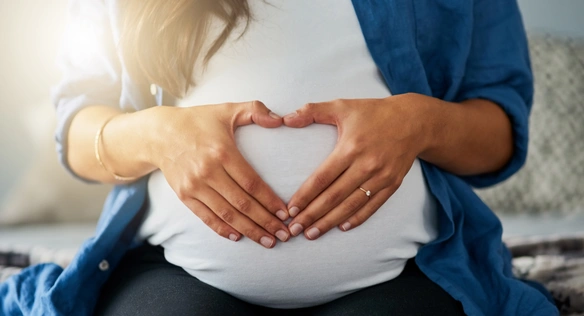(IUI)
Intrauterine Artificial Insemination
A Safe and Gentle, Minimally Invasive Option
Intrauterine Artificial Insemination is the least invasive Assisted Reproduction treatment. It is one of the recommended options for couples who need some medical help to conceive or for young women without a male partner who opt for IUI with donor sperm to have a child.
Also known as Intrauterine Insemination, this is a gentle and simple procedure. To increase the chances of fertilisation, the insemination should take place during your ovulation period. It will be performed in the same gynaecological consultation, without the need for anaesthesia, and involves the introduction of sperm directly into the uterus using a catheter.
- What is Artificial Insemination?
- Who is Artificial Insemination Recommended For?
- How does Artificial Insemination work?
- What should you know before starting Artificial Insemination treatment?
- Potential risks of Artificial Insemination
- Success rates of Artificial Insemination
- Cost of Artificial Insemination
- Artificial Insemination FAQs
Who is Artificial Insemination Recommended For?
Artificial Insemination is a gentle and effective fertility treatment that can help individuals and couples who have difficulty conceiving naturally. It is recommended for both infertility cases and for women who require donor sperm to become mothers.
This treatment is recommended for women under 38 with a healthy ovarian reserve, although your specialist will assess whether Artificial Insemination is the best option for you.
Intrauterine Insemination is recommended in the following cases:
At FIV Valencia, we recognise that every case is unique. That’s why we provide a diagnosis and a personalised treatment plan, 100% tailored to you.
- Cervical mucus problems: Sometimes, thick cervical mucus can prevent sperm from passing through the cervix to reach the egg. With IUI, sperm are placed directly into the uterus, bypassing the cervix to increase the chances of reaching the egg.
- Low sperm count or poor sperm quality: If the sperm from the partner is not optimal, Artificial Insemination allows us to select the healthiest sperm to increase the chances of success.
- Use of donor sperm: Artificial Insemination can be the treatment for women without a partner or lesbian couples who require donor sperm to have a baby.
- Erection or ejaculation difficulties: Intrauterine Insemination places the sperm directly into the uterus. This makes it a good solution for couples where the male partner has erection or ejaculation issues.
- Semen allergy: In rare cases, some people are allergic to proteins in semen, which can cause irritation. With IUI, these proteins are eliminated during sperm preparation, making the process more comfortable.
- Unexplained infertility: Sometimes, the cause of infertility cannot be identified, and IUI is recommended to increase the chances of pregnancy.




How does Artificial Insemination work?
Intrauterine Insemination involves several key steps before, during, and after the procedure. The FIV Valencia team will guide you through every phase of your Artificial Insemination treatment:
-
Ovarian stimulation: To increase the chances of pregnancy, your doctor will prescribe the necessary medication to stimulate your ovaries. The medication plan with gonadotropins (FSH) will be customised to encourage your ovaries to develop one to three follicles, which contain the eggs.
-
Monitoring follicle growth: We will monitor the development of your follicles using transvaginal ultrasounds to ensure they are growing correctly.
-
Ovulation induction: Once at least one follicle has reached the appropriate size (usually 18mm or more), we will trigger ovulation with an injection of human chorionic gonadotropin (hCG). This will release the eggs into the fallopian tubes within 36 to 48 hours, and we can schedule the insemination on the best day.
-
Sperm sample preparation: On the day of insemination, we will prepare the sperm sample in our laboratory. The sample can be provided by your partner at that time, or it can be thawed if it was previously donated. In the case of donor sperm, it will also be thawed and prepared on the day of insemination. Sperm is processed using a technique called capacitation or sperm washing. This allows us to select the healthiest and most active sperm for insemination.
-
Insemination: The Intrauterine Insemination procedure is quick and simple. The entire process lasts just a few minutes, is performed in the consultation room, and does not require anaesthesia. You will lie comfortably on the examination table, and a speculum (similar to the one used for a Pap smear) will be gently inserted. Then, a thin catheter will be carefully introduced through the cervix into the uterus, where the washed sperm will be gently injected.
-
Rest and monitoring: After the insemination, it’s advisable to rest for 5 to 10 minutes to allow the sperm to have the best chance of reaching the egg. After this brief rest, you can resume your normal activities without restriction.
-
Luteal phase support: After insemination, your doctor may recommend progesterone supplements to help maintain the uterine lining, ensuring the best conditions for implantation of the fertilised egg.
-
Pregnancy test: About 14 days after the Artificial Insemination, we will carry out a pregnancy test to check for a positive result. If positive, we will schedule an ultrasound between 7 to 10 days later to confirm the pregnancy.
What should you know before starting Artificial Insemination treatment?
Before starting the Artificial Insemination treatment, the FIV Valencia specialist will explain the process, necessary tests, potential risks, and key requirements to ensure the best chances of success.
Pre-treatment tests and medical exams:

- Ultrasounds: We will conduct the necessary ultrasounds to check the health of your uterus and ovaries, ensuring they are ready for the procedure.
- Semen analysis: Your partner’s semen will be analysed to assess sperm count, motility, and quality. This will help us to determine if Artificial Insemination is the most suitable treatment for you.
- Sexually transmitted infections (STI) and infection screening: Both partners will undergo STI and infection screening to ensure the procedure is safe.
- Blood tests: Blood tests will check your hormone levels and other factors that may affect fertility. This will help us determine if IUI is the best Assisted Reproduction treatment for you.
- Folic acid supplementation: Three months prior to starting the treatment, your doctor may prescribe folic acid to prepare for a healthy pregnancy for both you and your baby.
Cost of IUI

The total cost of IUI treatment may include:
- Monitoring and tests: Ultrasounds and blood tests are crucial for monitoring your ovulation cycle and determining the optimal timing for insemination. These services are included as part of our comprehensive care, although the costs may vary depending on the specific requirements of your treatment.
- IUI procedure: This covers the preparation of the sperm sample and the insemination procedure itself.
- Medication: Certain patients may require medication to stimulate ovulation or to trigger the release of eggs. These medications are tailored to your specific treatment plan and may incur additional costs.
- Donor sperm: If donor sperm is required, this will be an additional cost. The sperm sample will also be prepared in our laboratory to ensure the highest quality for the procedure.
If you need more detailed information, please consult our price list.
Artificial Insemination
FAQs
What should I do after the Artificial Insemination procedure?
Most patients can resume their normal activities immediately after Artificial Insemination. There are no restrictions, but you should listen to your body and avoid activities that make you feel uncomfortable.
When can I take a pregnancy test after Artificial Insemination?
A pregnancy test can typically be done about two weeks after the IUI procedure to determine the result.
Is the Artificial Insemination procedure painful?
IUI is generally not painful. Some patients may experience mild cramping or discomfort during or immediately after the procedure, but this typically subsides quickly.
What medications are used for Artificial Insemination treatment?
Medication is often prescribed to stimulate the ovaries and to encourage the release of more eggs. However, not all women will require medication. At FIV Valencia, your specialist will advise you on the appropriate medication for your IUI treatment.
How many IUI cycles should I try before considering IVF?
Most Assisted Reproduction specialists recommend trying 3–4 IUI cycles before moving on to In Vitro Fertilisation (IVF). The decision depends on factors such as your age, fertility diagnosis, and the results of previous IUI cycles. If IUI does not result in pregnancy after several attempts, or if specific challenges arise, IVF may provide a more effective solution. At FIV Valencia, your doctor will guide you through the process and help you make an informed decision about the most suitable treatment for you.